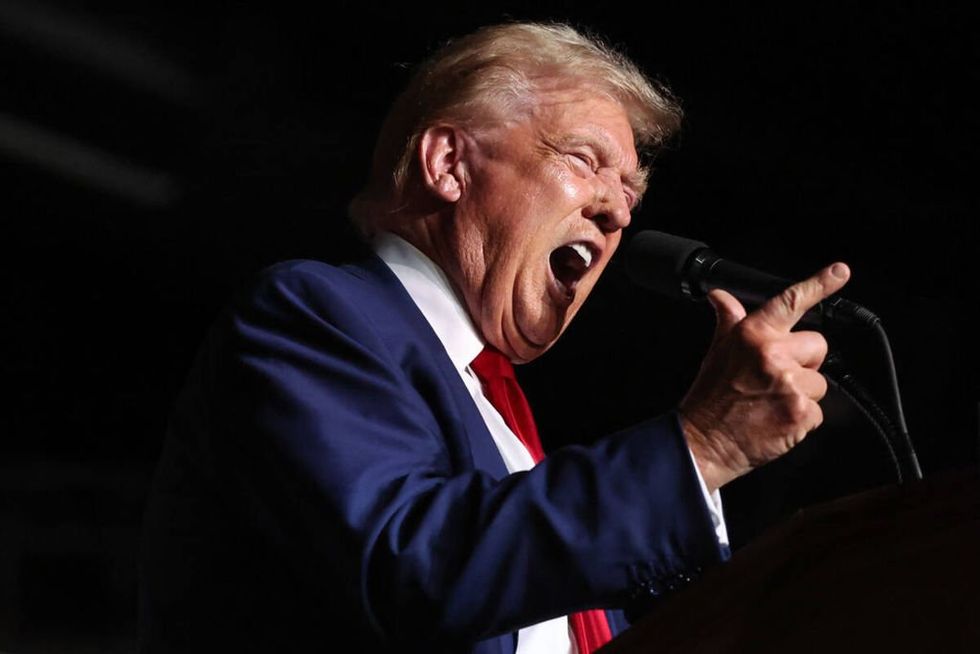Trump must take action against ‘untouchable’ bureaucrats
An estimated 2.2 million civilian federal workers serve at the pleasure of the president, despite only 4,000 being designated as political appointees. Donald Trump’s first priority as he prepares to retake office must be to establish that he can fire any of them. Whether they hold political appointments, Senate-confirmed positions, or civil service roles, all federal employees are subject to the president’s authority to terminate their employment. This includes workers in any department or so-called “independent” agency. If a congressional statute conflicts with his authority to fire someone, that statute is unconstitutional and must yield to the president’s plenary firing authority. Ironically, Trump’s biggest failure in his first term was his reluctance to say his famous line, “You’re fired!” To succeed in a second term, he must remove anyone who does not share his campaign vision. His primary promises are to reduce inflation and eliminate the deep state. Federal Reserve Chairman Jerome Powell is already challenging both promises, presenting Trump with an early test of his resolve. 'If any power whatsoever is in its nature Executive, it is the power of appointing, overseeing, and controlling those who execute the laws.' When a Politico reporter on Thursday asked Powell if he would comply if Trump asked for his resignation, Powell responded flatly, “No.” When pressed on whether he is legally required to resign, he tersely repeated, “No,” asserting his belief that no legal basis exists for firing him. Legally, Powell has no foundation to stay in his post if the president fires him, which Trump must do. While the legislature dominates in setting public policy and the federal budget, the president decides who serves in executive positions. The Senate can confirm high officers and may refuse to confirm a new appointee after the president removes someone senators support. However, the Senate cannot force the president to keep any personnel he wishes to dismiss, even if it passes a law granting tenure to that individual, as in the case of Powell, whose term doesn’t expire until 2026. The Supreme Court ruled in Ex Parte Hennen (1839) that the president’s power to appoint executive officials includes the power to remove them. This authority was upheld in Myers v. United States (1926) in a 70-page opinion by the chief justice, former President William Howard Taft. If a president can appoint anyone to head an agency within reason, Congress cannot restrict him to choosing or retaining any specific individual. Some argue that the Federal Reserve must remain independent, but that is a political stance, not a legal one. Constitutionally, there are only three branches of government. Since the Fed is neither legislative nor judicial, its governors are subject to the president’s authority to remove them. Congress can defund or abolish an office and refuse to confirm the president’s nominee, but it cannot impose a tenure law on the president. James Madison explained this separation of powers in a letter to Thomas Jefferson: [Congressional tenure laws] overlook the important distinction between repealing or modifying the office and displacing the officer. The former is a legislative, the latter an Executive function; and even the former, if done with a view of re-establishing the office and letting in a new appointment, would be an indirect violation of the theory and policy of the Constitution. For example, although Congress passed a law entitling the FBI director to a 10-year term, President Bill Clinton, at the recommendation of Attorney General Janet Reno, fired FBI Director William Sessions in 1993 during his sixth year in office. No executive branch figure operates outside the president’s authority. If an individual is not subject to the president’s authority, that individual is, by definition, not part of the executive branch. Therefore, the president can fire any civil service worker within main agencies and terminate anyone serving in independent commissions, such as the Federal Trade Commission, the Federal Election Commission, the Federal Communications Commission, the Securities and Exchange Commission, and the Merit Systems Protection Board. Based on his campaign promises, Trump has an obligation to exercise this authority. Although the Supreme Court once deviated from the originalist view espoused by Chief Justice Taft — in cases like Morrison v. Olson (1988) involving the independent counsel — that era has ended. The current Supreme Court is likely to support Trump’s power to fire executive officials. Just four years ago, the justices ruled 5-4 that the president has full authority to remove the director of the Consumer Financial Protection Bureau. With Amy Coney Barrett now on the court, Trump would likely have six votes in favor of a decision to fire someone like Powell. The president may not be a king, but he is the CEO of the executive branch. As James Madison said in 1789, “If any p


An estimated 2.2 million civilian federal workers serve at the pleasure of the president, despite only 4,000 being designated as political appointees. Donald Trump’s first priority as he prepares to retake office must be to establish that he can fire any of them. Whether they hold political appointments, Senate-confirmed positions, or civil service roles, all federal employees are subject to the president’s authority to terminate their employment. This includes workers in any department or so-called “independent” agency. If a congressional statute conflicts with his authority to fire someone, that statute is unconstitutional and must yield to the president’s plenary firing authority.
Ironically, Trump’s biggest failure in his first term was his reluctance to say his famous line, “You’re fired!” To succeed in a second term, he must remove anyone who does not share his campaign vision. His primary promises are to reduce inflation and eliminate the deep state. Federal Reserve Chairman Jerome Powell is already challenging both promises, presenting Trump with an early test of his resolve.
'If any power whatsoever is in its nature Executive, it is the power of appointing, overseeing, and controlling those who execute the laws.'
When a Politico reporter on Thursday asked Powell if he would comply if Trump asked for his resignation, Powell responded flatly, “No.” When pressed on whether he is legally required to resign, he tersely repeated, “No,” asserting his belief that no legal basis exists for firing him.
Legally, Powell has no foundation to stay in his post if the president fires him, which Trump must do. While the legislature dominates in setting public policy and the federal budget, the president decides who serves in executive positions. The Senate can confirm high officers and may refuse to confirm a new appointee after the president removes someone senators support. However, the Senate cannot force the president to keep any personnel he wishes to dismiss, even if it passes a law granting tenure to that individual, as in the case of Powell, whose term doesn’t expire until 2026.
The Supreme Court ruled in Ex Parte Hennen (1839) that the president’s power to appoint executive officials includes the power to remove them. This authority was upheld in Myers v. United States (1926) in a 70-page opinion by the chief justice, former President William Howard Taft. If a president can appoint anyone to head an agency within reason, Congress cannot restrict him to choosing or retaining any specific individual.
Some argue that the Federal Reserve must remain independent, but that is a political stance, not a legal one. Constitutionally, there are only three branches of government. Since the Fed is neither legislative nor judicial, its governors are subject to the president’s authority to remove them.
Congress can defund or abolish an office and refuse to confirm the president’s nominee, but it cannot impose a tenure law on the president. James Madison explained this separation of powers in a letter to Thomas Jefferson:
[Congressional tenure laws] overlook the important distinction between repealing or modifying the office and displacing the officer. The former is a legislative, the latter an Executive function; and even the former, if done with a view of re-establishing the office and letting in a new appointment, would be an indirect violation of the theory and policy of the Constitution.
For example, although Congress passed a law entitling the FBI director to a 10-year term, President Bill Clinton, at the recommendation of Attorney General Janet Reno, fired FBI Director William Sessions in 1993 during his sixth year in office.
No executive branch figure operates outside the president’s authority. If an individual is not subject to the president’s authority, that individual is, by definition, not part of the executive branch. Therefore, the president can fire any civil service worker within main agencies and terminate anyone serving in independent commissions, such as the Federal Trade Commission, the Federal Election Commission, the Federal Communications Commission, the Securities and Exchange Commission, and the Merit Systems Protection Board. Based on his campaign promises, Trump has an obligation to exercise this authority.
Although the Supreme Court once deviated from the originalist view espoused by Chief Justice Taft — in cases like Morrison v. Olson (1988) involving the independent counsel — that era has ended. The current Supreme Court is likely to support Trump’s power to fire executive officials. Just four years ago, the justices ruled 5-4 that the president has full authority to remove the director of the Consumer Financial Protection Bureau. With Amy Coney Barrett now on the court, Trump would likely have six votes in favor of a decision to fire someone like Powell.
The president may not be a king, but he is the CEO of the executive branch. As James Madison said in 1789, “If any power whatsoever is in its nature Executive, it is the power of appointing, overseeing, and controlling those who execute the laws.” It’s time to exercise that power to the fullest.
Originally Published at Daily Wire, World Net Daily, or The Blaze
What's Your Reaction?

































































































